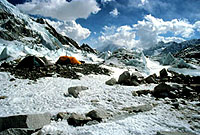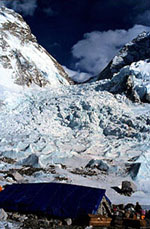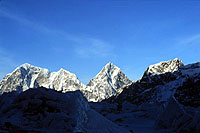
|
 |
 |
 The Approach March
The Approach Marchpart 6 | back to part 5 Base Camp Chungba, the head cook, stands waiting with cups of tea in one hand and a welcome wave in the other. After 2 weeks of being "on the trail" the team is relieved to be at what will be their home for the next 2 months. Tent platforms are built by piling rocks into a flat base and tents are erected in their full regalia of colors against the gray and white landscape.  The terrain is otherworldly, with ice spires and shiny blue
pinnacles protruding out of the rock-covered snow and ice. The
rocks, which Roger informs us are a combination of granite and
migmatite, look almost fake, jumbled together into piles by
the enormous strength of the ever-moving Khumbu Icefall, a
massive glacier at the base of Everest. Looking up the Icefall
we can see straight into the high valley of the Western Cwm on
Everest (pronounced "Koom", a Welsh word that means valley or
basin). The terrain is otherworldly, with ice spires and shiny blue
pinnacles protruding out of the rock-covered snow and ice. The
rocks, which Roger informs us are a combination of granite and
migmatite, look almost fake, jumbled together into piles by
the enormous strength of the ever-moving Khumbu Icefall, a
massive glacier at the base of Everest. Looking up the Icefall
we can see straight into the high valley of the Western Cwm on
Everest (pronounced "Koom", a Welsh word that means valley or
basin). Although we're surrounded by high peaks, the sun sets slowly, creeping behind Pumori's nearly perfect triangular summit. The evening hours serenade us with deep cracking sounds. The glacier that our tents are pitched on shifts centimeter by centimeter each day.  Occasionally we hear the roar of a rock fall or an avalanche
that always sounds closer than it presumably is. Having
reached the end of our two week long approach, we eagerly move
into the next phase of the journey: the assault on Everest.
Occasionally we hear the roar of a rock fall or an avalanche
that always sounds closer than it presumably is. Having
reached the end of our two week long approach, we eagerly move
into the next phase of the journey: the assault on Everest.
Next week: read all about the climb through the Khumbu Icefall to Camp I. Liesl Clark, NOVA Online's producer and writer, joined the expedition up to Base Camp. Photo Credits:(1) courtesy Jenny Dubin. Lost on Everest | High Exposure | Climb | History & Culture | Earth, Wind, & Ice E-mail | Previous Expeditions | Resources | Site Map | Everest Home Editor's Picks | Previous Sites | Join Us/E-mail | TV/Web Schedule About NOVA | Teachers | Site Map | Shop | Jobs | Search | To print PBS Online | NOVA Online | WGBH © | Updated November 2000 |